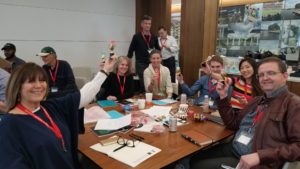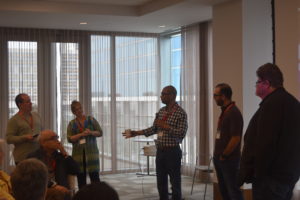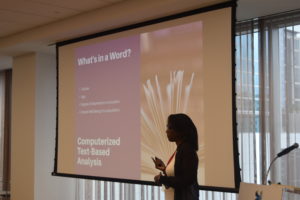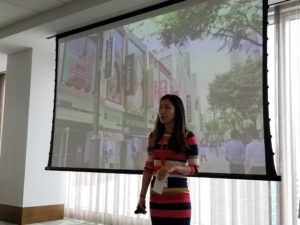 Introducing the Future was the topic of the 2019 Houston Foresight Spring Gathering on April 12-12. Since we spend so much time and effort explaining what foresight is to people new to it, we thought it would be useful to spend a day reviewing our various approaches and strategies for doing so. The “big vision” of the Houston Foresight program is that “Foresight is a disseminated practice in widespread use.” To achieve that, we are going to have to explain ourselves…a lot, and we may as well get good at it! Here are some of the cool ideas participants shared as part of their elevator speeches for explaining foresight:
Introducing the Future was the topic of the 2019 Houston Foresight Spring Gathering on April 12-12. Since we spend so much time and effort explaining what foresight is to people new to it, we thought it would be useful to spend a day reviewing our various approaches and strategies for doing so. The “big vision” of the Houston Foresight program is that “Foresight is a disseminated practice in widespread use.” To achieve that, we are going to have to explain ourselves…a lot, and we may as well get good at it! Here are some of the cool ideas participants shared as part of their elevator speeches for explaining foresight:
- Historians study the past, journalism the present, futurists the future
- We study change
- The first time you explore the future it can be scary, like a horror movie. But when you watch the movie a second, and you know what’s coming, it’s less scary (I just used this…thanks Hannah).
- Tie the future to what people know
- It’s important to know what changes to ignore, so you can focus on the important ones
- We help reduce fear of the future…movies have created negative images of the future
- We study the future to influence decisions in the present
- We help people figure out what’s happening now and use that to build into the future

- The practice effect: Basketball great chris paul knows what is coming because he has experienced it all before
- Ask people how they want to be remembered
- We will help you ask better questions
- Futures is “evidence-based creativity” (lots of oohs and aaahs on that one!)
- Qualitative analytics
- We tell stories about the future –humans don’t understand anything outside of a story
As always, we had a very interactive conference day with a wide range of activities, adroitly MC’d by Event Coordinator Kim berly Daniels. The Center for Houston’s Future hosted the meeting this year in their beautiful venue overlooking downtown Houston. We kicked off by asking participants to share their “elevator speech” of how they explain foresight to a new person. Mike Courtney brought down a vanload of “newbies” from Dallas and led them through a game of telephone in describing the cone of plausibility, which we learned is a new type of phone app. We also had a student explain their decision to switch their major to foresight to Mary Jane “Mom” Naquin, which was the comedic high point of the day. In the afternoon, NASA veteran John Charles led a candid and provocative discussion on the future of space exploration. At the close of the meeting, the launch of the Association of Professional Futurists’ new online platform for member engagement was revealed (link), as well as plans for a ProDev event in Mexico City on September 10 in front of the WFSF Conference.
berly Daniels. The Center for Houston’s Future hosted the meeting this year in their beautiful venue overlooking downtown Houston. We kicked off by asking participants to share their “elevator speech” of how they explain foresight to a new person. Mike Courtney brought down a vanload of “newbies” from Dallas and led them through a game of telephone in describing the cone of plausibility, which we learned is a new type of phone app. We also had a student explain their decision to switch their major to foresight to Mary Jane “Mom” Naquin, which was the comedic high point of the day. In the afternoon, NASA veteran John Charles led a candid and provocative discussion on the future of space exploration. At the close of the meeting, the launch of the Association of Professional Futurists’ new online platform for member engagement was revealed (link), as well as plans for a ProDev event in Mexico City on September 10 in front of the WFSF Conference.
Here are the presentations (links available for those that can be shared):
Future Cities Index_Mina McBride & Kimberly Daniels (suggests how government and policy leaders could use a lexicon of futures in their messages that would help  people and decision-makers decide whether to live in or come to their cities)
people and decision-makers decide whether to live in or come to their cities)
Don’t Forget Small Business_Verne Wheelright (how can we more effectively bring small business into the futures fold?)
Center for Houston’s Future_Brett Pearlman, Center for Houston’s Future (highlights from recent project work framing key issues for Houston’s future)
Design your agenda_Andy Hines (table teams were given the task of designing a day-long workshop to introduce a group of newbies to the future)
Student Presentations
- Is there a future for veterinary medicine_Karen Rosenthal

- Redefining Beauty_Hannah Kim
- Afro-Japanese Futures_Madebo Fatunde
Games for Futures Thinking_Eric Kingsbury (table teams were given the task of using card-based prompts to create a story about the future)
Foresight for Marriage_Cody Clark (the principles of good futures planning applied to marriage)
On Friday, Kimberly organized a led a tour of NASA for our large contingent of out-of-town guests. We all then gathered at the Phoenicia market for a healthy and tasty dinner in the Discovery Green section of downtown Houston. After the conference on Saturday evening, Jim and Marci Breaux hosted this year’s party featuring an outstanding menu of Cajun cuisine and a bread pudding to die for. We finally got some people to go into the water this year, the key being it was a hot tub. — Andy Hines
One of the things that I think we could benefit from is the thought that studying the future can help us understand what we bring from the past that moves us forward and what we hold on to from the past that holds us back. Sociologist Barbara Adam notes that there are things in our collective past that constitute future facts: we can’t ignore the large stores of nuclear wastes we’ve created since the 1940s, for example. Facts like these push us forward into futures that we may fail to recognize, even as we move inevitably in the direction we’re being pushed in. Realistically, we need to acknowledge that there’s only so much we can do to divert those futures.
At the same time, I’m fond of noting that we often drag the past — kicking and screaming — into the future with us. When we refuse to let go of those things that have outlived their purpose without understanding why we hold on to them, we create unnecessary drag or resistance to change. So maybe a good elevator speech might be “We decide on futures we want so we only pack what we need for the trip.”